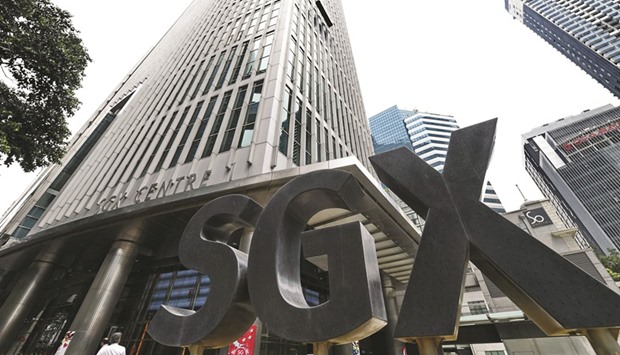Singapore dollar bondholders, already stung by the first default since 2009, face more companies struggling to meet the terms of their debt, after two oil and gas companies sought to extend maturities.
Ausgroup and Otto Marin are among 10 Singapore-listed firms that have started a process to loosen bond vows this year, up from eight in 2015, according to Bloomberg-compiled data. That includes efforts to extend the maturity of debt and loosen covenants requiring companies to maintain certain leverage levels. Oil-related firms face S$1.4bn ($1bn) of Singapore dollar bonds maturing through 2018, with S$325mn due by year end, according to Bloomberg-compiled data.
“We can probably expect more pain this year,’’ said Joel Ng, an analyst at KGI Fraser Securities in Singapore. “Cash flow remains tight.’’
Singapore’s bad loan measure rose to 2.25% in 2015, the highest since 2009, as a global economic slowdown increased the number of firms showing strains. While crude prices have recovered, energy giants have yet to restart investments that keep oil services companies in business.
Wealthy investors from the city who piled into higher-yielding debt, already suffering from PT Trikomsel Oke’s default, have limited options when borrowers seek to loosen covenants, according to Credit Suisse Private Banking.
“There’s no secondary market liquidity in many of these bonds making it difficult to exit in case you view the exercise unfavourably ” said Neel Gopalakrishnan, a Singapore-based analyst at the firm. “If a company breaches a covenant, it is technically a default. But seeking accelerated payment has more uncertainty and probably more downside.”
The average credit quality of firms listed on the Singapore Exchange has deteriorated over the past five years as the ratio of operating earnings to interest expenses weakened to 2.2 times from 7.3 times, Bloomberg-compiled data show.
In May, Ausgroup said in a filing that its consolidated total equity fell below A$160mn and it was in breach of a financial covenant and “an event of default’’ occurred. The company’s bonds due in October have slumped 23.4% this year and are trading at 75 cents on the dollar.
The firm’s debt-to-equity ratio is 106%, Bloomberg-compiled data show. The average ratio of 712 Singapore-listed companies has risen to 43% from 16% five years ago, according to the data.
Ausgroup, which makes wellhead platforms and operates out of Australia, Singapore and Thailand, is proposing to extend the maturity of its S$110mn notes due October 20 by as much as two years.
Otto Marine, which owns a fleet of vessels to support oil companies, said in a statement dated July 15 that a resolution was passed by bondholders to postpone the maturity of its S$70mn 7% notes due August 1 to February 1, 2017. The company’s controlling shareholder is seeking to delist the company and plans to use a loan extended by RHB Bank to repay bondholders assuming the delisting is completed.
Bank of Singapore said that companies are being pre-emptive in seeking to loosen covenants and that it expects that most companies should be able to survive as long as oil prices stay stable.
“It’s a negative in the sense that leverage is generally going higher because the economy is slowing here in Singapore but I don’t think it’s necessarily a huge indicator of some endemic stress,” said Todd Schubert, head of fixed income research at Bank of Singapore at Oversea-Chinese Banking Corp’s private banking unit.
Some companies have also sought to strike a balance by providing more security for investors, such as setting aside funds.
“In some consent solicitations, we have seen companies strengthen the bond structure by incorporating an interest reserve account, which in our view compensates for the weaker covenants” said Credit Suisse’s Gopalakrishnan.

A frontal view of the Singapore Exchange building. The average credit quality of firms listed on the SGX has deteriorated over the past five years as the ratio of operating earnings to interest expenses weakened to 2.2 times from 7.3 times, according to Bloomberg data.
